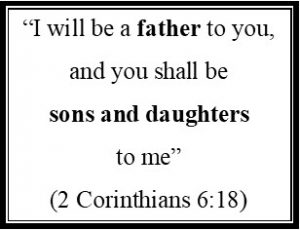 God the Father has always been God the Father, and God the Son has always been God the Son. This familial relationship is something of the nature of God, and we, too, as believers have become part of this family. While more could be said, a handful of Scriptures below describe what it means to be part of the family of God.
God the Father has always been God the Father, and God the Son has always been God the Son. This familial relationship is something of the nature of God, and we, too, as believers have become part of this family. While more could be said, a handful of Scriptures below describe what it means to be part of the family of God.
The Father and His Children
In eternity past, God “predestined us for adoptions as sons through Jesus Christ” (Eph 1:5), and when we believe and receive the Spirit, this adoption actually takes place, confirmed to us by the Spirit (Rom 8:14–17; Gal 4:4–7). We “become children of God” (John 1:12), and to be called “children of God” is possible only by the “love of the Father” (1 John 3:1). Having been separated from unbelievers and darkness, “the Lord Almighty” claims, “I will be a father to you, and you shall be sons and daughters to me” (2 Cor 6:18; cf. 6:14–18). When we first believe, we are “newborn infants” who “long for the spiritual milk” (1 Pet 2:2) and should eventually mature into those who eat “solid food” and have the ability to teach others (Heb 5:11–14).
The Greater Son Among God’s Children
The Father declared of Christ Jesus, “This is my beloved Son” (Matt 3:17), and we are “his offspring” as well (Isa 53:10). Along with the Father, Christ is “the builder of a house” (Heb 3:3; cf. 3:4), His church (Matt 16:18), and “Christ is faithful over God’s house as a son. And we are his house, if indeed we hold fast our confidence and our boasting in our hope” (Heb 3:6). Christ is also the elder Brother to all believers, so to speak, prominent as “the firstborn among many brothers” (Rom 8:29) who is “not ashamed to call them brothers” (Heb 2:11).
The Household and Its Code of Conduct
As children, we are “members of the household of God” (Eph 2:19) who “ought to behave in the household of God” as He prescribes (1 Tim 3:15). We are to “do good to everyone, and especially to those who are of the household of faith” (Gal 6:10). We are to “be imitators of God, as beloved children” (Eph 5:1). Relationships in our biological family guide us for how to interact with other members of the family of God: “Do not rebuke an older man but encourage him as you would a father, younger men as brothers, older women as mothers, younger women as sisters, in all purity” (1 Tim 5:1–2).
The Inheritance to Us as Heirs
Each believer is “a son” and thus “an heir through God” (Gal 4:7) of “an inheritance that is imperishable, undefiled, and unfading, kept in heaven for you” (1 Pet 1:4). We are “heirs of God and fellow heirs with Christ, provided we suffer with him in order that we may also be glorified with him” (Rom 8:17).
About David Huffstutler
David pastors First Baptist Church in Rockford, IL, serves as a chaplain for his local police department, and teaches as adjunct faculty at Bob Jones University. David holds a Ph. D. in Applied Theology from Southeastern Baptist Theological Seminary. His concentration in Christian Leadership focuses his contributions to pastoral and practical theology.
